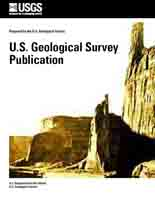Estuarine water-quality and sediment data, and surface-water and ground-water-quality data, Naval Submarine Base Kings Bay, Camden County, Georgia, January 1999
Links
- More information: USGS Index Page (html)
- Download citation as: RIS | Dublin Core
Abstract
Suggested Citation
Leeth, D.C., and Holloway, O.G., 2000, Estuarine water-quality and sediment data, and surface-water and ground-water-quality data, Naval Submarine Base Kings Bay, Camden County, Georgia, January 1999: U.S. Geological Survey Open-File Report 2000-75, iii, 12 p. :maps ;28 cm., https://doi.org/10.3133/ofr200075.
ISSN: 2331-1258 (online)
Study Area
| Publication type | Report |
|---|---|
| Publication Subtype | USGS Numbered Series |
| Title | Estuarine water-quality and sediment data, and surface-water and ground-water-quality data, Naval Submarine Base Kings Bay, Camden County, Georgia, January 1999 |
| Series title | Open-File Report |
| Series number | 2000-75 |
| DOI | 10.3133/ofr200075 |
| Year Published | 2000 |
| Language | ENGLISH |
| Publisher | U.S. Dept. of the Interior, U.S. Geological Survey ;Branch of Information Services [distributor], |
| Contributing office(s) | South Atlantic Water Science Center |
| Description | iii, 12 p. :maps ;28 cm. |
| Time Range Start | 1999-01-01 |
| Time Range End | 1999-01-31 |
| Country | United States |
| State | Georgia |


